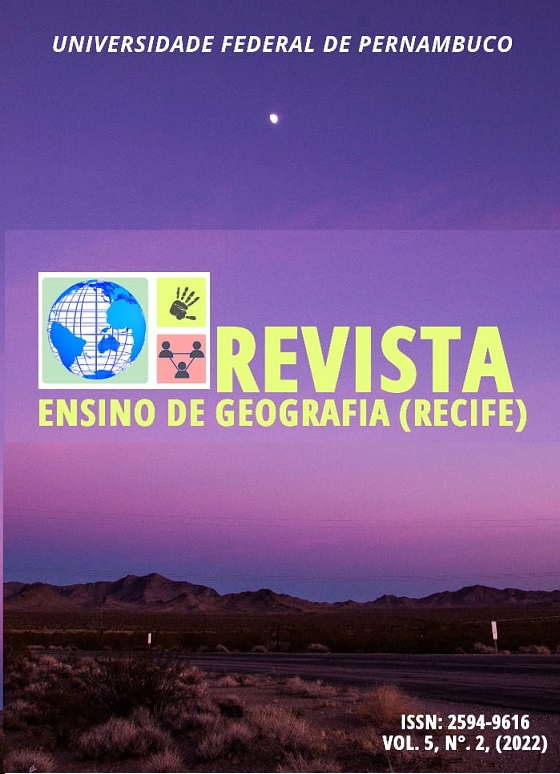Creative imagination as a methodological possibility in geography classes: an experience in pibid
DOI:
https://doi.org/10.51359/2594-9616.2022.250853Keywords:
teaching geography, poetic imagination, phenomenologyAbstract
This article aims to discuss the possibilities of using creative imagination, or poetics, as a methodology for teaching Geography, because after observations made in Geography classes for high school students in Salvador, we noticed that the theoretical-methodological contribution that teachers adopt for their classes, they do not seek to touch the students' imagination, which is often not encouraged and explored for the construction of geographic knowledge. In this context, we will discuss the light of the philosopher Bachelard (1991, 1993, 1994, 2006) the imagination, highlighting the poetic imagination, its possibilities and how it can be worked in the classroom, then we will try to propose a dialogue with the author Vygotsky (2009) who has a relatively similar idea to Bachelard's on this topic, but makes connections with learning. To analyze this assumption, an experiment was carried out in the project of initiation to teaching at the Instituto Federal da Bahia, in the year 2017, during the month of May, and with that we analyzed that poetic imagination can bequite beneficial for Geography classes, if adopted. as a methodological element to compose Geography classes.
References
ALENCAR, E.M.L.S. Criatividade. Brasília: Editora Universidade de Brasília, 1993
BACHELARD, G. A poética do devaneio. São Paulo: Martins Fontes, 2006.
BACHELARD, G. A poética do espaço. Tradução de Antonio de Pádua Danesi e revisão de Rosemary C. Abílio. São Paulo: Martins Fontes, 1993.
BACHELARD, G. A terra e os devaneios da vontade: ensaio sobre a imaginação das forças. São Paulo: Martins Fontes, 1991.
BACHELARD, G. O direito de sonhar. Tradução José Américo Motta Pessanha. Rio de Janeiro: Bertrand Brasil, 1994.
BULCÃO, Marly. Bachelard: a noção de imaginação. Revista Reflexão, Campinas, nos 83/84, p. 11-14, jan./dez., 2003.
CASTELLAR, S. (org.). Educação Geográfica teorias e práticas docentes. São Paulo: Contexto, 2005.
FEYERABEND, P. Contra o método. 2. ed. São Paulo: Editora Unesp, 2011.
FURTADO, Vanessa Clementino. Estudos sobre imaginação e criatividade: Contribuição de Lev Semenovich Vigotski e Cornelius Castoriadis. TEDE, São Paulo, set. 2013
HOLZER, W. O conceito de lugar na Geografia Cultural-Humanista: uma contribuição para a Geografia Contemporânea. Geographia, Ano V, n.10, p.113-123, 20.
JOSEPH, M. O trivium: as artes liberais da lógica, gramática e retórica. Tradução e adaptação de Henrique Paul Dmyterko. São Paulo: É realizações editora, 2008.
PUJOL, Rosa. Educacion Cientifica para la ciudadania em formación. In: Alambique, n. 32, abril, 2002.
RICHTER, Sandra. Bachelard e a experiência poética como dimensão educativa da arte. Santa Maria, v. 31 - n. 02, p. 241-254, 2006.
SILVA, A. N. B. . Imaginação criadora e educação: considerações sobre o pensamento de gaston bachelard. In: Anais da xvii semana de humanidades da ufrn. Natal, rn: ufrn, 2009.
VIGOTSKI, L. A construção do pensamento e da linguagem. São Paulo: Martins Fontes,2001. VIGOTSKY, L. S. La imaginación y el arte em la infância. Madrid: Akail, 2009.
VIGOTSKI, Lev Semionovich. Psicologia da Arte. São Paulo: Martins Fontes, 1998.
ZANETIC, João. Física também é cultura. São Paulo, 1989. Tese (Doutorado em Educação). Faculdade de Educação da Universidade de São Paulo.
Downloads
Published
How to Cite
Issue
Section
License
Copyright (c) 2022 Anderson Castro de Santana

This work is licensed under a Creative Commons Attribution 4.0 International License.
Authors who publish with this journal agree to the following terms:- Authors retain copyright and grant the REVISTA ENSINO DE GEOGRAFIA (RECIFE) right of first publication with the work simultaneously licensed under a Creative Commons Attribution NonCommercial International 4.0 (CC BY-NC) that allows others to share the work with an acknowledgement of the work's authorship and initial publication in this journal.
- Authors are able to enter into separate, additional contractual arrangements for the non-exclusive distribution of the journal's published version of the work (e.g., post it to an institutional repository or publish it in a book), with an acknowledgement of its initial publication in this journal.
- Authors are permitted and encouraged to post their work online (e.g., in institutional repositories or on their website) prior to and during the submission process, as it can lead to productive exchanges, as well as earlier and greater citation of published work.



